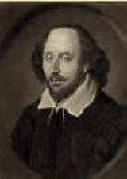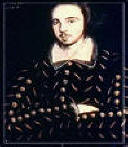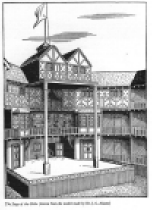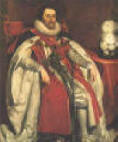|
|
|
|
|
|
|||||
|
|
|
|
|
|
|
|
|
Introduction:
Impartiality remains impossible with
the study of Shakespeare.
 The acknowledged "genius" of civilization
provides insights into humanity, demonstrates control and mastery of his artistry,
and possesses the
ability to generate emotional, conceptual, and psychological feelings through
the use of poetical images, while tightly constructing dramatic plots that enhance the
poetical appreciation.
The acknowledged "genius" of civilization
provides insights into humanity, demonstrates control and mastery of his artistry,
and possesses the
ability to generate emotional, conceptual, and psychological feelings through
the use of poetical images, while tightly constructing dramatic plots that enhance the
poetical appreciation.
Admittedly, "Bardolotry" has reached ridiculous levels in academia, so that every theorist (most especially within the Twentieth Century) has catapulted the uniqueness of Shakespeare into his or her own image--or, more accurately, those who interpret and glorify those theorists--with new PhD's attempting to identify themselves with the critic more than Shakespeare). The result has been an imbalance, as opposed to rationality, with regard to Shakespeare Studies: the attention has been in so many directions that one forgets the mind that conceived the plays and its place in civilization. Should one study the primary works, that is, Shakespeare's own plays; the pay-off, as it were, makes itself known in the beauty and depth of the humanity.
I certainly have no problem in singing the praises of what I find in Shakespeare; that wisdom, entertainment, beauty, and doubt, although not contested with, seems eminently more powerful than any other writer. For those who study his plays, there seems an acknowledgment of their reach, depth, and humanity that supersedes all other experiences. This certainly may not be so with some readers or viewers of his art; however, enough of us have agreed that it no longer becomes viable to explain the sensation. Yet the current climate of Shakespeare has much to apologize for, given that, in our attempt to further his art and understanding, we have allowed the critic in various fields foreign to appreciation to become the centralized focus of study; that is, we honor the appreciator as opposed to the appreciated. New Ph.D's need to satisfy demands of Shakespeare critical specificity so as to render the meaningless more weight than the plays themselves. Thus, it seems less fallacious more than ever to call for some sort of moratorium on Shakespeare studies, in order to allow the need for publishing to outstrip the merit, and in order to put some balance back into the appreciation. In that way, such statements as I began with will hold merit, and no longer seem hyperbolic generalizations.
The result of the disparate critical approaches, those promising more "insight"? We currently have a glut of silliness that obscures straightforward language, criticism, or appreciation of the thing itself: the plays. So, I offer no apologies in offering superlatives with regard to the mind that produced such plays (even if one finds only meaning in but a few, for lack of appreciation for the others): such appreciation seems too exuberant only within the context of meaningless, artificial state of encomiums today, which more often than not, become couched in another's writings.
But as for the plays themselves, all seems to balance so flawlessly that one finds it difficult to imagine that a single individual could prepare and conceptualize such a labyrinth of meaning, feeling, and "entertainment." We can never forget that such artistry remained, and was admitted to by its very author and fellow players, contemptuous of the term "art" when applied to stage fare; fortunately, with the perspective of time we see these works and its author for the genius he was.
Even with today's theoretical emphasis upon eras and cultures as opposed to individual achievement, William Shakespeare defies--or at least remains the "fly in the soup"--of toney, popular culture and criticism, with its insistence upon epochs as the authors of ideas, performances, or other creative endeavors. While the English Renaissance Stage remains, pound for pound, the most prolific of creative eras civilization has known, Shakespeare admittedly remains but one of numerous, ingenious poetical and dramatic artists; however, when looking at the corpus of works, only Christopher Marlowe comes near the poet from the small town of Stratford. And, perhaps had Marlowe lived longer than his 29 years (and he was the same age as Shakespeare) before his death at a tavern not far from London in Deptford, he may have inspired the adulation now reserved for Shakespeare, who, at the expense of all other excellent poets of his age, serves today as the center of an enormous system of stars.
Of course, Marlowe
 did not
survive to add to his extraordinary if brief career. When one compares similar works of Shakespeare to
those of Marlowe, an unfair likening perhaps, he finds that the "either/or,"
exaggerated stagings of Marlowe waste something of more nuanced and subtle
plotting, substituting easy crowd appreciation,
relying heavily upon the familiarity of a Catholic past, those moral plays and exemplum
offerings. Much like his character Doctor Faustus, who, having sold his
soul, turns his quest for wisdom into cheap parlor tricks. However,
Marlowe's "mighty line" cannot go unappreciated, and the poet represented one
who knew what his audience wished and had to rely upon the strengths and
liabilities of his materials at hand, such as
the tragedian Ned Alleyn's dominance of the stage, with his "fustian" playing style,
or the
times, which demanded plays filled with the prejudices and familiar biases.
did not
survive to add to his extraordinary if brief career. When one compares similar works of Shakespeare to
those of Marlowe, an unfair likening perhaps, he finds that the "either/or,"
exaggerated stagings of Marlowe waste something of more nuanced and subtle
plotting, substituting easy crowd appreciation,
relying heavily upon the familiarity of a Catholic past, those moral plays and exemplum
offerings. Much like his character Doctor Faustus, who, having sold his
soul, turns his quest for wisdom into cheap parlor tricks. However,
Marlowe's "mighty line" cannot go unappreciated, and the poet represented one
who knew what his audience wished and had to rely upon the strengths and
liabilities of his materials at hand, such as
the tragedian Ned Alleyn's dominance of the stage, with his "fustian" playing style,
or the
times, which demanded plays filled with the prejudices and familiar biases.
Here, I allude to works such as Marlowe's The Jew of Malta, a cartoon of a drama--nonetheless effective and demanding of stage and audience alike--in comparison to Shakespeare's The Merchant of Venice. Those with knowledge of Shakespeare's craft will no doubt find the comparison unfair; after all, Marlowe composed his drama about the age of 25, while Shakespeare penned his probably at age 32. Much can change in a less than a decade, as those who favor Marlowe's or the Earl of Oxford's "authorship" for Shakespeare's plays could well testify. As but one example, Roderigo López, himself Jewish and Portuguese, served as Queen Elizabeth's personal physician and interpreter and guardian for Antonio Pérez, a half-Jewish pretender to the throne of Portugal; he became caught-up in court intrigue and the suspected assassination attempt on Elizabeth. The Earl of Essex, that self-absorbed aspirer to the British throne, whose military and personal disasters seemed to embolden his ignorance, insisted upon Lopez's guilt and execution, so that Elizabeth, weakened by the political necessities of her day, to say nothing of cultural racism, agreed to the execution of López, although she remained unconvinced, with no clear evidence in existence.
The doctor suffered the most horrible of executions reserved for traitors in 1594. One wonders how such material would find its way to the stage under Marlowe's pen. The Admiral's Company, who originally performed The Jew of Malta, brought out an enormously successful re-staging after López's death. But in Shakespeare's rendition of the events and general European, Christian animus toward Jews, we have a problematic text at best. And should one compare the poetry of the two plays, with the remarkably strong poetical statements by Shakespeare as to how it feels to suffer daily slanders and hatred, to feel the burn of hatred and appetite for revenge, or to express how mercy trumps justice--even if conceived in a familiar moral-play environment at once familiar and recognizable to the "simplest" of auditors. Merchant seems more than a few years removed from its predecessor.
But, again, much of this remains unfair
because one can't prove a negative: Marlowe died, probably assassinated, in
Deptford, while arguably Shakespeare benefited from the popular, danger-prone
poet's death. So too, tastes seem to
have changed enough that what Richard Burbage did, as lead tragedian for
The Chamberlain's Men, the
company that his colleague Shakespeare played and wrote for, acquired in time a greater
acceptance than Alleyn's "fustian" style. One must remember that the
London stage
remained in its infancy, with the first constructed-for-playing venue, the
Theatre, only dating back to 1576.
as lead tragedian for
The Chamberlain's Men, the
company that his colleague Shakespeare played and wrote for, acquired in time a greater
acceptance than Alleyn's "fustian" style. One must remember that the
London stage
remained in its infancy, with the first constructed-for-playing venue, the
Theatre, only dating back to 1576.
By poor example, that's as much as to say that "The Godfather" (1972) serves as poor, unsophisticated forbear to "The Godfather, III" (1990)--and that's eighteen years difference, as compared to the seven or eight between Marlowe and Shakespeare. And the first of "The Godfather" trilogy, though with the same director and many of the original actors, fares much better than the last. Or, perhaps a better example would include D. W. Griffiths "Birth of a Nation" (1915) with a W. C. Fields comedy of the early 1920s, or the first "Talky" (actually, the first to synchronize sound and action) "The Jazz Singer" of 1927. And yet, do we assume that no changes in playing styles, preferences for action by audiences, appreciations for changes brought about by technology, history, or "taste" differs from Lillian Gish as Elsie in "Birth of a Nation" and Al Jolson as "The Jazz Singer"? The latter, in fact, has all the biases and prejudices of both films, yet manages to "humanize and personalize" the ethnic and racial stereotypes so as to become "somewhat" more palatable.
One of the most exciting aspects of Shakespeare's art lies within its numerous levels. One can read any of several children's collections of Shakespeare's plays, such as Marchette Chute's Stories From Shakespeare or those of Mary and Charles Lamb, and find enjoyment even as an adult reader. Middle-School children can read or view a Shakespearean play and enjoy the plots, appreciate, with guidance, the poetry, and follow the inherent meanings and suggestions on a simple level. But Shakespeare offers something new to anyone who approaches his poetry, whether as children or seasoned adults. With each new appreciation, new layers become evident, so that the question usually follows, "did Shakespeare know that he incorporated all that into his plays?"
The easy answer follows, it doesn't matter. All those layers of meaning remain part of his art, whether conscious, unconscious, deliberate, or unintentional: they all flow from the pen of the dramatist, with his learning, increasing skills, experience, and observations. To categorize or to explain genius remains an impossibility; we know it when we see it, but how it came about still remains a mystery. While the quality of many Elizabethan dramatists achieved an exceptional level of brilliance remains a mystery of the age, save to say that factors such as the discovery of the New World, the beginnings of a Middle Class, the possibilities of sustaining a living with a university degree that did not necessitate going into the clergy, and the ready, eager audience for stage plays in a permanent venue all contributed. But without explanation remains that Shakespeare, having no degree, could achieve so much means that his star shone more brilliantly than those of his contemporaries.
Those who argue that Edward de Vere, Earl of Oxford--or the other equally contentious choices, such as Marlowe, Queen Elizabeth, or any number of candidates who died prior to Shakespeare's later plays--say that their candidate was better able than the poor boy from Stratford to pen such greatness. Undoubtedly, Shakespeare and his family were recusants, Catholics who remained Protestants in name only, those who held to the older faith. As many have argued, the grammar-school educated Shakespeare would have learned enough Latin, and some Greek, as well as the essentials that today would constitute more than a university degree. If he tutored children of a noble, Catholic family with a library, he would have learned an additional amount to enable him to anticipate world experience and to learn enough geography, old literary plots, and British history in order to write about exceptional persons and events of antiquity for use in his plays.
In writing for that stage, Shakespeare remained conservative; he followed the the lines drawn by previous dramatists, if only a few decades previously, and knew about the older moral plays, which were still performed before the monarchy degreed they should cease and he was but a child. To understand that stage, two factors become most prominent: the Elizabethan stage consisted of Analogy and Convention. That is, theatrum mundi dominated: the theatre, represented as "world stage." In the amphitheatre of Elizabethan professional playing arenas, the structure looked much like a bowl, an open-to-the-sky structure, with three tiers of seating, an open, uncovered areas called the "pit" before the stage, and at the end of this amphitheatre a stage with with a "Tiring House" at the back (short for "attiring), complete with probably two doors, perhaps a balcony, posts that held up the top structure, and space behind for entrances, exits, and storage. In the middle of the stage area, some five-feet above the pit and perhaps as much as forty-feet across, a trap door could be found, which would permit devils to arise from Hell, special entrances, or sunken properties, such as Ophelia's grave. Even today, this under-stage area remains known as "hell."
The top of this attiring structure, above
the balcony or upper-room was called "heaven." Thus, the analogy of the
physical space allowed spectators to see God's great metaphor: playing on the
stage equates to life on earth.
 We
all have our entrances and exits (as Jacques says in As You Like It), we
play our time upon the stage, a "brief hour or two" (as Macbeth says), and then
we exit, stage left, into "reality." The stage represents illusion, much
as physical life on earth does. This analogical concept fashions the
Renaissance Stage, ever mindful to the viewer, no matter the stage fare.
We
all have our entrances and exits (as Jacques says in As You Like It), we
play our time upon the stage, a "brief hour or two" (as Macbeth says), and then
we exit, stage left, into "reality." The stage represents illusion, much
as physical life on earth does. This analogical concept fashions the
Renaissance Stage, ever mindful to the viewer, no matter the stage fare.
In addition, the stage remains "Conventional": meaning, "a shorthand concept for reality." To save time, to save energy, to avoid explaining what the audience knows, the stage developed a number of conventions so that audience and player alike understood their meanings. For example, the soliloquy (a word, by the way, never used in Shakespeare's day; in fact, it was penned by Augustine for what he termed a "private meditation." Later ages would designate what Elizabethan dramatists meant by the "soliloquy" after Augustine's definition). In this convention, the player resides alone on stage, speaks the truth as he or she knows it, and addresses the audience directly, even if speaking thoughts that would otherwise go unheard. Other conventions include the aside (two-thousand people may hear what one two-feet away on stage does not; the use of boy actors to play the parts of women, a signal that a woman is mad by the fact her hair is down, not bundled up, or sighing as a sign of love-sickness. The list of conventions remains considerable; but, no audience member asks, "what's he or she doing?" They know, by the experience and easy understanding of physical movements, body language, or typical stage behavior--"this stands for the following."
"I can't understand the language"
represents one of the complaints often heard by students with regard to
Shakespeare, to which the answer remains "nonsense." In 1611, King James I
of England put together a committee to translate the Bible. James found
previous bibles, most especially the Geneva Bible, translated by exiled
reformists such as John Calvin, as too prosaic. This edition rendered a
biblical text dull, flat, and so straightforward as to remove all the passion
and feeling from the intent of the original texts, even if mostly accurate in
translation. James wished a text rendered in a style equal to the feeling
and values of it worthwhile books. So it is that the King
 James
"Authorized Version" renders a biblical text in poetry--even its prose achieves
a feel and sense of poetic rhythm. In fact, the James committee enlisted
several poets of the stage to translate the biblical books of poetry into
English, much to the dismay of Puritans who hated the stage and all it
represented.
James
"Authorized Version" renders a biblical text in poetry--even its prose achieves
a feel and sense of poetic rhythm. In fact, the James committee enlisted
several poets of the stage to translate the biblical books of poetry into
English, much to the dismay of Puritans who hated the stage and all it
represented.
Yet the language does not represent the unintelligible, except for the lazy reader who doesn't make the attempt. When seen on the stage, as was intended, language presents no problem, although we ascribe that to the action, which in reality is not the case. Can one understand the Bible? If so, it represents the same language as Shakespeare used, which was not prevalent in his day, but stood for something more noble, higher, and "special." Usually, what we don't understand are the many different usages of words--different definitions--or references to things unknown to us.
In literature, two kinds of writing exist. Named for the Troubadours of France and Europe who told these stories in the Middle Ages, we have two kinds of stories or events: trobar clos or trobar clus. Trobar clos means the "closed style." That is, information or events that only contemporary people would understand remains part of this style. Today's "sit-coms," such as "Seinfeld" or "Sex and the City" or other fashionable shows reference current events. In one-hundred or two-hundred years, people will need a glossed text to understand what they watch, read, or hear about. On the other hand, the "open style" (Trobar Clus) means that no "footnotes" or gloss becomes necessary; no matter the day, the year, the millennium, for the most part people will understand the text without recourse to gloss or notes--Oedipus may serve as example, even if one appreciates knowing who the god Apollo was and for what he stood.
A good text of Shakespeare, and enough patience to care, should suffice. One can easily read the text (remembering, of course, that the plays were meant for viewing, not reading) without recourse to notes. The meaning to any careful reader will make itself known as the play progresses, with the poetry gaining an increasing grasp upon one as the images and metaphors build and influence and understanding. While loathe to admit that anyone cannot experience these influences, let me say finally that all art requires some acquired taste--experience and greater appreciation of all worthwhile things demand such. Those who say they know nothing of art but still know what they like admit to nothing more than an intolerance, prejudice, and appreciation of themselves, not art. This remains as much to say that everyone has a right to an opinion, by which we usually mean prejudice. No one has such a right--it merely occurs. Opinion means "informed judgment"; without such, we mean we behave prejudiced and intolerant, which is no right--it merely exists, much like stupidity. It should go without saying that people express opinions everyday without having any informed judgment. The world remains full of the ignorant.
Texts
Today, we find ourselves blessed with dozens of Shakespearean texts. One can find substantial, glossary and footnoted-rich texts, appended editions with CD's for listening to fine actors reciting Shakespeare, or even prose-editions of Shakespeare that transcribe the entire play to prose, not poetry (which means one misses the rich experience that makes Shakespeare "Shakespeare"). Anthologies, individual texts, composites of Shakespeare's tragedies, comedies, or histories abound. Some have too many notes, some too little, and some, like the baby bear, are just right. So too, the films of Shakespeare can easily be acquired. Whether the British Broadcasting Company's editions of all Shakespeare's works or individual movies, one can find any number of interpretations and presentations of the plays. Short of seeing a live production, I would recommend a good film prior to reading a text, given that reading Shakespeare remains the most unnatural of all experiences with his art.
You should find here a number of helpful sites and pages devoted to Shakespeare's theatre, his art, his world. The knowledge of and insights into humanity remain the poet's greatest strengths; yet Shakespeare's plays cannot be separated from "entertainment"; it served the entirety of purpose during his own day, and it should represent no less today. All else remains a bonus.
[coming soon: links to the following]

● Courses
● Past Syllabi and Requirements
● Writing the paper and some topic suggestions
● Act and scene breakdowns for some plays
● Information on the Globe Theatre
● Understanding the Elizabethan and Jacobean Theatre
● Understanding the past: the Medieval Theatre
● Shakespeare on film